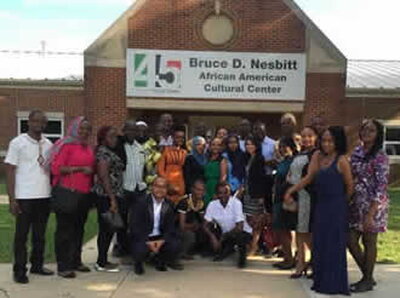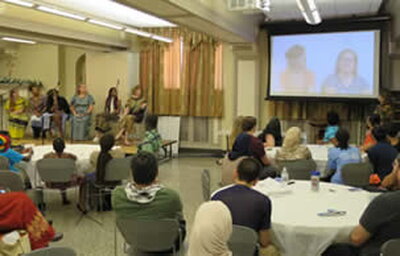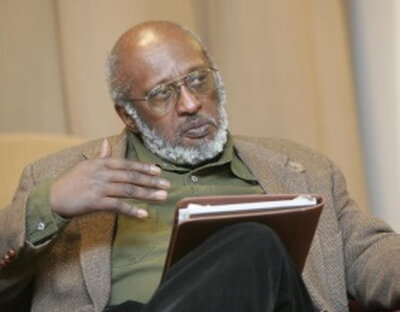
2016 Young African Leaders Initiative: Public Management Institute

From June 17 through July 27, 2016, the Center for African Studies hosted 25 participants from the Mandela Washington Fellowship for Young African Leaders, Public Management Institute. The CAS team, led by Professor Assata Zerai and assisted by Maimouna Barro, Fredrick Dixon, Jeffrey Friedman, Terri Gitler, Benito J. Mariñas, Carlos Rubio, Brenda Nyandiko Sanya, and Soo-Yeon Yoon, received support from members of the African Students’ Organization who provided friendship activities and support as well.
Fellows between the ages of 25 and 35 with established records of accomplishment in promoting innovation and positive change in their organizations, institutions, communities, and countries came from across the continent to hone their skills and establish US-based connections. Early on in their six-week stay, the Fellows participated in two team-building exercises at Allerton Park and at the Krannert Center for the Performing Arts. Along with members of various area houses of worship, the Fellows also participated in the spiritual life of Champaign, and got a feel of the everyday at the Urbana Market at the Square and downtown Champaign.
The Fellows spoke to and asked questions of local government leaders in Urbana and Champaign, received a tour of the Urbana City Council headquarters, and attended a Champaign City Council meeting. Other field trips included the Urbana Champaign Sanitary District, Illinois American Water facility, and the Citizens’ Energy Group in Indianapolis, as well as Carle and Presence Hospitals. Julliet Wanjiku Gichuru, a medical doctor with a Master’s in International Health and Applied Epidemiology, explained “One of the highlights of the Mandela Washington Fellowship was the opportunity to interact with other Africans who in their own way are each driving change in their countries. The shared vision that things can and should be better combined with the enthusiastic view that the change required is within reach invigorated my drive for societal change back home in Kenya."
Becasue of the rich presidential history in Illinois, the Fellows spent a day in Springfield where they toured the Illinois Capitol Building, seeing where President Obama began his career in national politics, as well as a trip to Abraham Lincoln Home and Museum. After the trip to Springfield, Thierry Alix Guigma, who is a medical doctor and biostatistician, described the trip as very informative. He expressed that “Abraham Lincoln’s story shows on what ground this country and society was founded. To see that Obama also started his career in Springfield was also profoundly important. I wish all the Fellows from Africa could have seen this.” At the conclusion of the six weeks, over one thousand Fellows attended a Presidential Summit in Washington, DC, where President Obama led a town hall presentation.
Upon returning to Kenya, Gichuru was among a small group of Fellows invited to meet with U.S. Secretary of State John Kerry. Gichuru asked Kerry a question on a recurring theme that emerged in discussions between the Fellows and various speakers during the six-week institute: She asked how the state department ensures that multinational corporations investing in Africa adhere to environmental safety and human safety standards, especially in host countries where the policies and laws are not effective in terms of enforcement. This is a question that we hope the Mandela Washington Fellows continue to ask of those partnering with their organizations, communities, countries, and continent.
The Center for African Studies thanks everyone involved with the program and wishes continued success to our talented participants committed to making positive change. Specifically, we would like to sincerely thank the following community members for their support and engagement during the six weeks. For robust and engaging discussions about local government public management, thank you to these local leaders and their dedicated staff: Rep. Carol Ammons, Councilman Tom Bruno, Champaign Mayor Deb Feinen, Michelle Jett, Urbana Mayor Laurel Prussing, Dennis Roberts, and Champaign Deputy City Manager Matt Roeschley,
Many thanks to Professors Ian Brooks, Jeffrey Bulanda, Jennifer Carrera, Marcelo Garcia, Jeremy Guest, Craig Koslofsky, Kenny Long, Faranak Miraftab, Laila Hussein Moustafa, Ken Salo, Joanna Shisler, Sam Smith, and Brenda Wilson, who took time from their research and scheduled summer activities to lead rigorous and informative sessions.
Additionally, local community business and professional people provided a wealth of information showcasing the strengths of the C-U community. Thank you Jennifer Cord and Cindy Magsaman, Presence Covenant Medical Center; Lara Darling, Vermilion County Conservation District; Marilynne Davis, Rotary; Claudia Lennhoff, Champaign County Health Care Consumers; Wednesday Medlen, Credit Union National Association; Cheryl Merkel, Central Illinois Credit Union; Kathleen Robbins, Jatropha Pepinyè; Bryan Smith, MTD; and George Wissmiller, Mahomet aquifier.
Finally, participants were fortunate to enjoy the company and expertise of “Peer Collaborators,” business, academic, and other members of our local communities, who spent time with our guests in order to help them forge connections that would be useful to them when they returned to their home countries.
In closing, we quote participant Acaga Taban Ismail Michael, a strategic information manager, “I believe I have now the necessary skills to inspire my communities using the set of skills acquired from the Fellows and as President Obama stated, one needs to ‘worry less about what you want to be and worry more about what you want to do’ to inspire others.”
All of us at the Center for African Studies and the Public Management Institute wish our Fellows much success as they continue to serve the continent of Africa.
2016 Summer Institute for the Languages of the Muslim World (SILMW)

The Summer Institute for Languages of the Muslim World (SILMW) is held every summer at the University of Illinois at Urbana-Champaign. The Summer 2016 institute offered courses in Arabic, Persian, Swahili, Turkish, and Wolof.
SILMW is an 8-week program, divided into two 4-week semesters. It offers daily language classes as well as a variety of daily co-curricular activities which are meant to enhance the classroom instruction and provide additional channels and contexts in which language can be practiced. In addition, the co-curricular activities provide a wide background related to the culture and traditions of the countries where the languages are spoken. Co-curricular activities include lectures on cultural topics, movies, cooking classes, different workshops, and more.
For the first time SILMW 2016 opened its doors to six motivated high school students for a 2-week intensive Elementary Arabic course. This is an introductory course in Modern Standard Arabic for high school students with limited or no prior knowledge of the Arabic language.
Towards the end of the program, the students went on a field trip to Chicago. The field trip was designed in the tradition of the program. First the students visited the Oriental Institute Museum at the University of Chicago. Then they had lunch at the famous Persian Reza’s restaurant, got a tour and a lecture of the Bridgeview Mosque, and finished the trip by going to shops selling Arabic and Turkish products.
One of the last program events was the SILMW showcase, where students of each course presented some of what they learned during the summer in a performance in their target language.
Building Africana Studies in Community Colleges

Mr. Prexy Nesbitt presenting at “Teaching Africana Studies at Community Colleges” workshop
CAS and its Title VI consortium partner, the Northwestern University Program for African Studies, are moving into the second year of an outreach project that targets community colleges. The aim of this effort is to build networks of Africana studies scholars across institutional barriers and contribute to the expansion of African Studies in community colleges.
The first year included two major symposia. The first was a two-day event titled “Building Africana Studies in Community Colleges” under the theme “A Changing Africa in a Changing World.” Held on March 10–11 and supported by a Department of Education Title VI grant, the symposium began with the panel discussion “African Studies and the Pan-African Vision: From Garvey to Biko to Black Lives Matter.” Featured speakers included UIUC faculty Teresa Barnes, Erik McDuffie, and Ken Salo. A second panel, “Transatlantic Perspectives on Islam and Africa,” featured Misbahudeen Ahmed-Rufai (City Colleges of Chicago [CCC]), Ibrahima Ndoye (Parkland Community College), and Mauro Nobili (UIUC). Prexy Nesbitt (photo at left) of Columbia College Chicago’s humanities, history, and social sciences department gave the keynote address, “Telling No Lies: History of African Liberation Movements, Lessons for the United States Today.” CCC professors Daniel Davis, Edward Davis, Crystal Rudds, and Myti Sengstacke offered insightful presentations of their experiences when “Teaching Africana Studies at Community Colleges.”
A second symposium took place at Northwestern on April 29th and included Prexy Nesbitt again along with Professor Evan Mwangi of Northwestern and Daniel Davis, (photo at right) who presented a paper on “Teaching Africana Studies Through Hip-Hop.” A video of Dr. Davis’s fascinating talk has been posted to the CAS You Tube channel and submitted to TED Talks for consideration.
These symposia represent a major breakthrough in establishing links with community colleges around the state. Faculty from Malcolm X, Kennedy-King, South Suburban, Richland, Lakeland, and Parkland community colleges took part. Efforts for 2016-17 year will focus on curriculum development.
The Bridging Cultures Inititive
On July 11-16, 2016, the Bridging Cultures program on "Local and Global Perspectives in Education" was held on the UIUC campus. An initiative of the Illinois-Northwestern African Studies Consortium, it consisted of cross-cultural, international programming on educational practice, pedagogy, and policy. This summer, secondary school teachers from California, Florida, Illinois, Massachusetts, and New York met with 20 visiting international secondary educators from the Global Institute for Secondary Educators —a U.S. Department of State program held annually at the University of Illinois.
Intensive collaboration in workshops, structured discussions, and guided lesson planning provided opportunities for the establishment of relationships between American and international teachers that stimulated partnerships and coordinated activities in their respective classrooms. Led by Dr. Jeffrey Friedman, the program gave U.S. teachers the opportunity to share their craft, while gaining new understandings of cultural and educational practices in many other countries that will enhance their ability to infuse their curricula with multicultural perspectives.